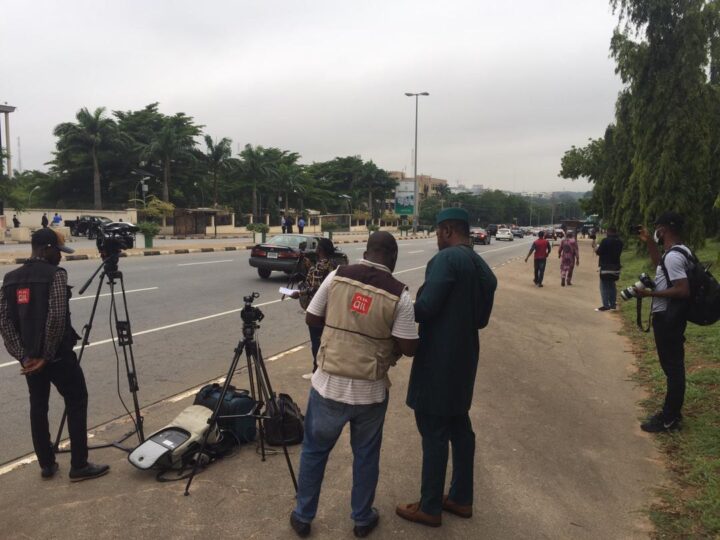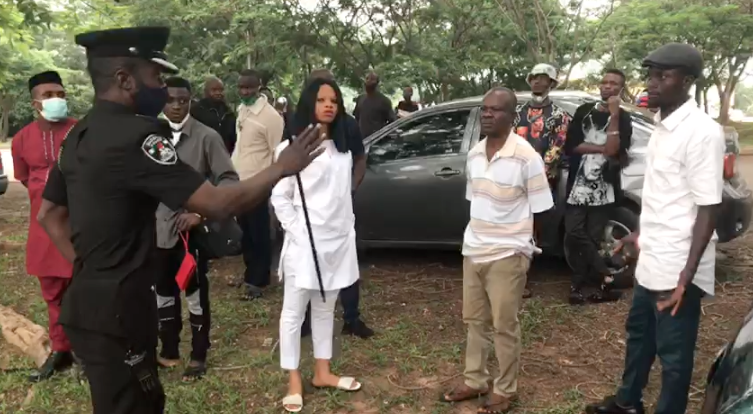The Niger Delta Power Holding Company Limited (NDPHC) has controversially guaranteed a N7 billion loan to a private company, ASolar Systems Nigeria Limited, under the Solar Power Naija programme, TheCable can report.
ASolar Systems is promoted by Hakeem Shagaya (pictured), an in-law to Vice-President Yemi Osinbajo.
Osinbajo is the chairman of the board of NDPHC, a company owned by the three tiers of government.
NDPHC officials have told TheCable that the board followed due process in approving the guarantee and that they are not aware of any conflict of interest.
Advertisement
In its letter to the Central Bank of Nigeria (CBN), NDPHC offered to stand as the guarantor to ASolar Systems to secure a N7 billion loan from Sterling Bank Plc with a five-year tenor.
If ASolar defaults in payment for 90 days, NDPHC will become liable and the deductions will be made from its account as the guarantor.
This is not the first time NDPHC will mortgage its resources as a guarantee to private companies, TheCable understands.
Advertisement
NDPHC previously committed the Federal Government of Nigeria to a $118 million guarantee for Accugas, a company of 7Energy Ltd (now owned by Savannah Energy), to supply gas to Calabar GenCo.
With NDPHC not generating enough revenue to pay, the liability is currently being borne by the ministry of finance which now settles the monthly invoices running into billions of naira.
THE SOLAR PROJECT
In April, Osinbajo launched the solar home system (SHS) in Jangefe community, Kazuare Emirate, Jigawa state, as part of the Solar Power Naija programme, a component of the Nigeria Economic Sustainability Plan (NESP), to provide energy access to 25 million Nigerians in unserved communities across the country.
Advertisement
The economic sustainability committee (ESC) in charge of the implementation of the NESP is chaired by Osinbajo.
The solar programme was supported through a N140 billion concessionary lending for private off-grid developers to provide solar systems to five million households.
The Jangefe inauguration marks the beginning of 100,000 solar connections through a partnership between ASolar Systems Nigeria Limited, a local developer, and NDPHC — with funding from the CBN through a loan facility from Sterling Bank under the supervision of the Rural Electrification Agency (REA).
The initiative will see beneficiaries paying N3,000 to N4,000 monthly, followed by a transfer of ownership to them after full payment for the systems.
Advertisement
“The power provided is not free but we have put in place structures to make sure that the connections are affordable to all those who will use it,” Osinbajo was quoted to have said.
“Then the Niger Delta Power Holding Company, ably led by Chiedu Ugho, who has been an important catalyst for off-grid solar systems such as we have here today. They were the first to launch the 100,000 systems with Asolar, the same group that is providing this, has provided in several states of the federation.”
Advertisement
But what was, however, not made public are the details of the loan obtained from the commercial bank for the solar project, the role of NDPHC and the possible conflict of interest.
NDPHC STANDING AS GUARANTOR
Advertisement
Here is a little background.
NDPHC, a government-funded agency, manages the assets of the National Integrated Power Project (NIPP), an initiative birthed by the federal government to build independent power stations across the country and address inadequate power in the Nigerian Electricity Supply Industry (NESI) — using private sector-orientated best business practices.
Advertisement
NDPHC is co-owned by the federal, state and local governments, and it has invested across the power sector value chain.
It has focused more on gas-fired plants over the years, but it took interest in solar projects lately.
The board of directors of NDPHC, chaired by Osinbajo, includes six state governors representing the geopolitical zones in the country.
Other members are Sale Mamman, minister of power; Zainab Ahmed, minister of finance; Abubakar Malami, attorney-general of the federation (AGF), and Timipre Sylva, minister of state for petroleum resources.
Prior to the launching of the solar home systems, the board of NDPHC had written to the CBN requesting to stand as guarantor for Asolar to obtain a N7 billion loan from the commercial bank.
“Asolar Systems Nigeria Limited (Asolar) being one of the companies registered under NEP intends to access N7 billion out of the program facility (the facility) to deploy 100,000 solar home systems (SHS) across the country and desires to partner with NDPHC being the agency listed alongside REA for the implementation of the SHS programme in the Economic Sustainability Plan. The facility will be provided by Sterling Bank Plc (Sterling Bank) through funds from their Differentiated Cash Reserves Requirements (DCRR) and has been approved by the CBN Committee of Governors,” the letter read.
“The board of NDPHC has approved that, contingent on satisfactory due diligence and agreed commercial terms between and amongst NDPHC, Asolar and Sterling Bank (Definitive Agreements), NDPHC serve as a guarantor for Asolar.
“The guaranteed sum will be adjusted annually to reflect repayments of the facility by Asolar in order to reduce the sum covered by the Letter of Comfort.
“Subject to definitive agreements, the proposed process for the calling of this guarantee is listed below. No portion of NDPHC’s monies will be set aside to cover this guarantee and deductions will only be made from the NDPHC account if Asolar has accrued a repayment default for a period of 90 days.
“When this occurs, Sterling Bank which will be the administrator of the PCA for the program will issue a drawdown notice to NDPHC copying the Director, Banking Services at the CBN, NDPHC working with Messrs Asolar will have 14 days to fulfil payment obligations to Sterling.”
SO, WHO OWNS ASOLAR TECHNOLOGY?
In 2019, Hakeem Shagaya, promoter of ASolar, spoke on behalf of the Nigeria Electrification Project (NEP) grant recipients during the agreement signing for the performance-based grant (PBG) and output-based fund (OBG) in Abuja.
“I implore all the companies that have qualified to reach for the stars and believe that you can do even ten times the capacity that you put down on paper,” he said.
https://twitter.com/realREANigeria/status/1185685546309443584?s=20
Hakeem is the son of billionaire businesswoman, Bola Shagaya, who is an in-law to the vice-president.
In 2018, Oludamilola, Osinbajo’s daughter, got married to Oluseun Bakare, Hakeem’s brother.
The deal has also called to question the powers of the NDPHC board to make a commitment of N7 billion — which is believed to be above the threshold or approval limit of the agency.
Some of the matters arising are: did this pass through the federal executive council (FEC) approval? Was there any review or legal advice from the office of the attorney-general of the federation on the appropriateness of issuing such an instrument? Was there any advice from the Debt Management Office (DMO) before NDPHC made the intervention, considering a guarantee could crystallise?
NDPHC: ‘WE FOLLOWED DUE PROCESS’
In response to an enquiry by the TheCable, Olufunke Nwankwo, head of communication and public relations at NDPHC, said the board of the agency followed due process in issuing the letter of comfort for the private company.
“NDPHC is working with Asolar and Rural Electrification Agency (REA) to implement the deployment of solar home systems across the country pursuant to the mandate given to NDPHC under the Federal Government’s Economic Sustainability Plan. Please rest assured that NDPHC management complied with due process in every step taken so far in the project with all the requisite approvals including board approvals,” Nwankwo said.
“NDPHC did not issue a Letter of Comfort to Asolar. We only supported CBN to issue a Comfort Letter to Sterling Bank to support this project based on our experience working with Asolar in deploying 20,000 units of Solar Home Systems in Nigeria. It should be noted that NDPHC was mandated under the Economic Sustainability Plan approved by the Federal Executive Council, as an implementing agency for the 5 million Nationwide solar connections of which the current Asolar project is a part.
“We are not aware of any relationship between our board chairman and Asolar as no such relationship formed part of any consideration for decision to work with Asolar. Our decision to continue to work with the company was purely based on their performance in the already deployed 20,000 Solar Home Systems on which they delivered.
“For clarity, it is important to note that NDPHC’s working relationship with the company dates back to 2016 when they were engaged for the 20,000 Solar Home System. The engagement went through due process with BPP ‘NO Objection’ Certificate obtained in early 2016 before the current management of NDPHC.
“For the current project, the company also went through the World Bank and Rural Electrification Agency prequalification and certification under the World/REA Nigerian Electrification Programme which is the requirement for participation in the five million solar connections.”
Laolu Akande, the spokesperson to the vice-president, told TheCable that the issue of conflict of interest is a “red herring”.
Add a comment






